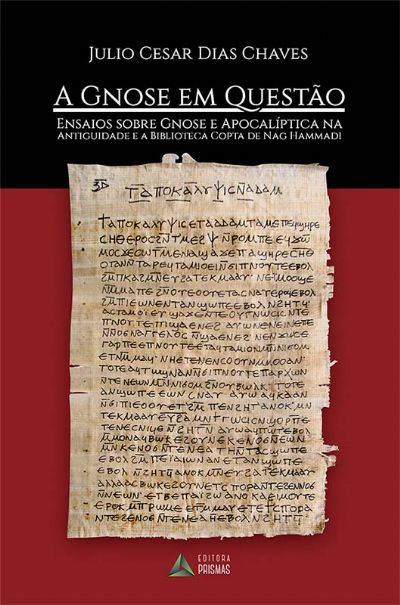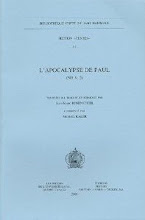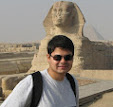Nesse ano de 2015, comemoramos os 70 anos da descoberta dos códices de Nag Hammadi, os manuscritos que eu estudo e que são de fundamental importância para o estudo de manifestações marginais do cristianismo primitivo.
Para comemorar a data, a Faculdade de Teologia e Ciências das Religiões da Université Laval, em Québec, no Canadá, vai realizar no fim desse mês de maio (nos dias 28, 29 e 30) um colóquio que vai reunir diversos estudiosos - renomados e novos pesquisadores - dos manuscritos de Nag Hammadi.
Eu terei a honra de participar do colóquio apresentando algo sobre o assunto da minha tese.
Para quem se interessar, segue o programa completo do evento:
Nag Hammadi à 70 ans. Qu’avons-nous appris ?
Nag
Hammadi at 70: What Have We Learned?
29 au 31 mai 2015 / May
29-31, 2015, Université Laval
Programme
Vendredi, 29 mai 2015
8 h 30 – 9 h Ouverture du colloque :
Tuomas Rasimus, Fellow de l’Académie finlandaise,
Université d’Helsinki ; Professeur associé, Université Laval
Gilles Routhier, Doyen de la
Faculté de théologie et de sciences religieuses, Université Laval
Anne-France
Morand, Directrice de l’Institut d’études anciennes et médiévales, Université
Laval
Louis Painchaud,
Directeur
du Groupe de recherche sur le christianisme et l’Antiquité tardive, Université
Laval
Séance 1 Réexamens
– Président : Michel Roberge,
Université Laval
9 h – 9 h 40 There is no such thing as Gnosticism: But what have we got instead?
Einar
Thomassen, Université de Bergen
9 h 40 – 10 h 20 Reconsidering Docetism
Karen
L. King, Université Harvard
10 h 20 – 11 h The History of the Term gnôstikos (Part II)
Lance Jenott, Université d’Oslo
11 h – 11 h 30 Pause-santé
Séance 2 L’Évangile
selon Thomas – Président :
Jean-Daniel Dubois, École pratique des
Hautes études de Paris
11 h 30 – 12 h
10 The Gospel of Thomas After 70 years: Where We Have Been, Where We Are,
and Where We Are Going
André Gagné, Université Concordia
12 h 10 – 12 h 50 Un mot sur les « trois paroles » dites à Thomas
(EvTh, log. 13, et AcTh 47, 2)
Paul-Hubert Poirier, Université Laval
12 h 50 – 14 h 30 Diner / Lunch
Séance 3 Le
contexte de l’Égypte du IVe siècle – Présidente : Elaine Pagels, Université Princeton
14 h 30 – 15 h 10 Textual Fluidity and Post-Nicene Rewriting
in the Nag Hammadi Codices
Hugo Lundhaug, Université d’Oslo
15 h 10 – 15 h 50 Gospel of Truth – Some New Insights on the
History of Valentinianism on the Basis of a New Analysis of Genre, Context and
Content
Christoph
Markschies, Université Humboldt de Berlin
15 h 50 – 16 h 30 La production et
la destination des codices de Nag Hammadi (suite)
Louis
Painchaud, Université Laval
16 h 30 – 17 h Pause-santé
Séance 4 Présentation
d’affiches I – Président : Einar
Thomassen, Université de Bergen
17 h
– 17 h 15 Taylor Baruchel,
Université Concordia : ‘Like a Virgin’:
Gender, Virginity and Authority in the Hypostasis of the Archons
17 h 15
– 17 h 30 Ivan
Miroshnikov, Université d’Helsinki : The
Text of the Gospel of Thomas: Some Remarks
17 h
30 – 17 h 45 Joseph
E. Brito, Université Concordia : The Characterization of Mary and Salome in
the Gospel of Thomas: A Narrative Approach
17 h 45
– 18 h Bradley
Rice, Université McGill : Of Doubles and
Doppelgängers on the Eastern Frontier: Judas Thomas and Mani’s Heavenly Twin
19 h Souper /
Dinner
Samedi, 30 mai 2015
Séance 5 Le
codex VII. La réception moderne du gnosticisme – Président : Hugo Lundhaug, Université d’Oslo
9 h – 9 h 40 La gestion du temps dans la Paraphrase
de Sem (NH VII, 1) : Perspectives narratologique et eschatologique
Michel Roberge, Université Laval
9 h 40 – 10 h 20 Les gnostiques basilidiens et les textes du codex VII de Nag Hammadi
Jean-Daniel Dubois, École pratique des Hautes études de Paris
10 h 20 – 11 h Nag Hammadi Research and its Impact on the
Presentation and Construction of ‘Gnosticism’ in Non-Specialist Scholarship
Michael Kaler, Université de Toronto à Mississauga
11 h – 11 h 30 Pause-santé
Séance 6 Nouveau
Testament et gnosticisme – Président :
Christoph Markschies, Université Humboldt de Berlin
11 h 30 – 12 h
05 Revisiting the ‘Gnostic’ Paul
Tilde
Bak, Université de Copenhague
12 h 05 – 12 h 40 Johannine Christianity and Sethianism:
Reconsiderations in Light of the Ophite Myth
Tuomas Rasimus, Université
d’Helsinki / Université Laval
12 h 40 – 12 h 50 Response to Tilde Bak and Tuomas Rasimus
Elaine Pagels, Université Princeton
12 h 50 – 14 h 30 Diner / Lunch
Séance 7 Pistis Sophia. Apocryphon de Jean – Président : Zlatko Pleše, Université de Caroline du
Nord à Chapel Hill
14 h 30 – 15 h 10 Le processus salvifique des âmes selon la Pistis
Sophia (Codex Askewianus)
Claudio
Gianotto, Université de Turin
15 h 10 – 15 h 50 Les rapports entre
le livre III de la Pistis Sophia du
codex Askew et la recension longue de l’Apocryphon de Jean
Steve Johnston, Université Laval
15 h 50 – 16 h 30 The Apocryphon
of John: The Current State of Research
Antti Marjanen,
Université d’Helsinki
16 h 30 – 17 h Pause-santé
Séance 8 Présentation d’affiches II – Président : John D. Turner, Université du Nebraska à
Lincoln
17 h – 17 h 15 Spiros
Loumakis, Université Concordia : Purity and Danger
in the Nag Hammadi “Library”
17 h 15 – 17 h 30 Julio Dias Chaves, Université Laval
: Reading Nag Hammadi Codices in Late-Antique
Egypt: Some Methodological Issues in Light of the Theory of Reception
17 h 30 – 17 h 45 Calogero Miceli, Université
Concordia : Acts of Peter and the Twelve
Apostles (NHC 6.1) after Seventy Years
17 h 45 – 18 h Meaghan Matheson, Université
Concordia & Stéphanie Machabée, Université McGill :
Bridging Nag Hammadi with the Ancient
Mediterranean World: A Lens on Gender Discourse
19 h Souper /
Dinner
Dimanche, 31 mai 2015
Séance 9 Gnosticisme
et philosophie – Présidente : Karen
King, Université Harvard
9 h – 9 h 40 Plotinus and the Gnostics as Interpreters of Plato’s Dialogues
John D. Turner,
Université du Nebraska à Lincoln
9 h 40 – 10 h 20 A Route from Plato to Plotinus Via the
Platonizing Sethians? A New
Hypothesis for the Historical Development of Later Platonist Metaphysics
Zeke Mazur, Université Laval
10 h 20 – 11 h Theology and Epistemology in Nag Hammadi Writings
Zlatko Pleše, Université de Caroline du Nord à Chapel
Hill
11 h – 11 h 30 Pause-santé
Séance 10 Pratiques
et rituels – Président : Claudio
Gianotto, Université de Turin
11 h 30 – 12 h 10 Onction, purification et parfum de bonne
odeur agréable au Père dans l’Évangile de la Vérité (NH I, 3)
Anne Pasquier,
Université Laval
12 h 10 – 12 h 50 Les exercices spirituels dans les textes de
Nag Hammadi
Jean-Pierre
Mahé, École pratique des Hautes études,
Paris
12 h 50 – 14 h 30 Diner / Lunch
Séance 11 Hermétisme,
alchimie, séthianisme – Président :
Jean-Pierre Mahé, École pratique des
Hautes études, Paris
14 h 30 – 15 h
10 ‘They Are Called
the Stranglers’: The Christian Reading (and Rewriting?) of Hermes’ Perfect
Discourse (NHC,8)
Christian Bull, Université
d’Oslo
15 h 10 – 15 h 50 Marsanès et Nicothée dans la littérature
gnostique, philosophique et alchimique
Eric Crégheur, Université
Laval
15 h 50 – 16 h 30 Les
gnostiques séthiens et la Bible
Bernard
Barc, Université Jean-Moulin (Lyon-III)
16 h 30 – 17 h Pause-santé
Séance 12 Archéologie et dialectologie – Présidente : Anne Pasquier, Université Laval
17 h – 17 h 40 Les sources
archéologiques du monachisme égyptien au IVe
siècle : état de la question
Victor Ghica, École
Norvégienne de Théologie
17 h 40 – 18 h 10 La dialectologie copte et les textes de Nag Hammadi
Wolf-Peter Funk, Université Laval
18 h 10 – 18 h 30 Synthèse et conclusion du colloque
20 h Banquet
de clôture









